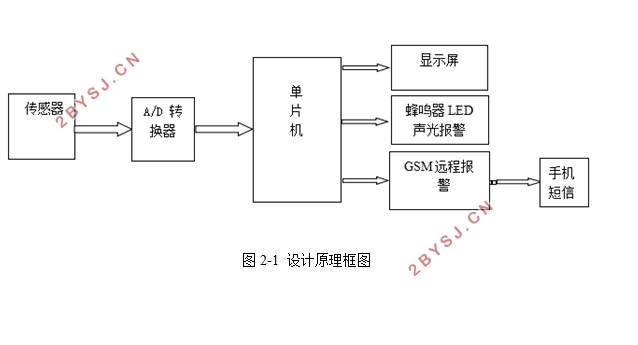烟雾报警器的设计
无需注册登录,支付后按照提示操作即可获取该资料.
烟雾报警器的设计(任务书,论文15000字)
摘要
随着当今社会经济的快速发展,人们的生活水平得到了大幅度地提高,但随之而来的隐患也跟着增加,火灾就是其中的一种,所以防范火灾的工作就显得越来越重要。那么就很有必要来设计一种在功能和使用方面都相对实用的烟雾报警器来满足人们的需求,将隐患及时地消灭掉,让各种损失都大幅度地减小。
本次设计以单片机为控制核心,用MQ-2传感器来检测空气中的烟雾浓度并通过A/D转换器转换为数字信号后输入到单片机,通过单片机来判断烟雾浓度是否超过预定值,若超过预定值则会发出声光报警,并且通过显示屏显示当前浓度,此外,本次设计还安装了GSM模块,报警时该模块会向指定的手机发送短信来实现远程报警。
本次设计的烟雾报警器使用在各个防火地点,是一种高效灵活,经济实惠的报警器,有较高的实用价值。
关键词:单片机 MQ-2传感器 GSM模块 报警器
Design of smoke alarm
Abstract
With the rapid development of social economy,people's living standards have been greatly improved,but the ensuing hidden danger also follow to increase,fire is one of them,So it is more and more important to guard against the fire and it is very necessary to design a practical smoke alarm to meet the needs of the people in the aspect of function and use,to eliminate the hidden danger in time,let all kinds of losses are greatly reduced.
This design with single chip microcomputer as the control core,using MQ-2 sensor to detect the concentration of smoke in the air and through the A/D converter into a digital signal input to the microcontroller,through the MCU to determine whether the smoke concentration exceeds the predetermined value,If more than a predetermined value, the sound and light alarm will be issued and display the current concentration through the display screen,In addition,the design also included the GSM module,When the alarm, the module will send a message to the designated mobile phone.
In short, the design of smoke alarm applied to each place need to guard against the fire,which is a highly efficient and flexible, affordable alarm, there is a high practical value.
Key Words:Singlechip;MQ-2 sensor;GSM module;Alarm

目 录
摘要-------------------------------------------------------------I
ABSTRACT---------------------------------------------------------II
第一章 前言 1
1.1 烟雾报警器的研究背景和意义 1
1.2 烟雾报警器的国内和国外研究现状 2
1.2.1 国内研究现状 2
1.2.2 国外研究现状 2
1.3 烟雾报警器的研究思路 3
第二章 烟雾报警器研究方案的论证 4
2.1 设计原理框图 4
2.2 方案的选择 4
2.2.1 烟雾传感器的选择 4
2.2.2 A/D芯片的选择 5
2.2.3 单片机芯片的选择 6
2.2.4 显示模块的选择 7
2.2.5 GSM模块的选择 7
2.3 系统设计方案的确定 8
第三章 硬件的设计与实现 10
3.1 单片机最小系统的设计 10
3.1.1 晶振电路 10
3.1.2 复位电路 10
3.2 烟雾检测电路与信号处理电路 11
3.3 声光报警电路 11
3.4 显示屏电路 11
3.5 GSM远程报警电路 12
3.5.1 GSM通信模块 12
3.5.2 SIM卡接口电路 13
3.6 系统的整体硬件结构图 14
第四章 软件的实现 15
4.1 编译环境的介绍 15
4.2 系统的软件设计流程 17
4.2.1 系统主程序设计及流程框图 17
4.2.2 主程序初始化流程框图 18
4.2.3 主程序代码 19
4.2.4 AD转换子程序及流程框图 21
4.2.5 LCD1602显示屏显示子程序及流程框图 23
第五章 系统的调试 26
5.1 系统的调试步骤 26
5.2 软硬件的调试 27
5.2.1 软件的调试 27
5.2.2 硬件的调试 27
5.3 系统成功测试的结果 28
第六章 结论和展望 30
6.1 结论 30
6.2 展望 31
参考文献 32
致谢 34
